七年级下>Module 11 Body language>Unit 3 Language in use
文档属性
| 名称 | 七年级下>Module 11 Body language>Unit 3 Language in use | 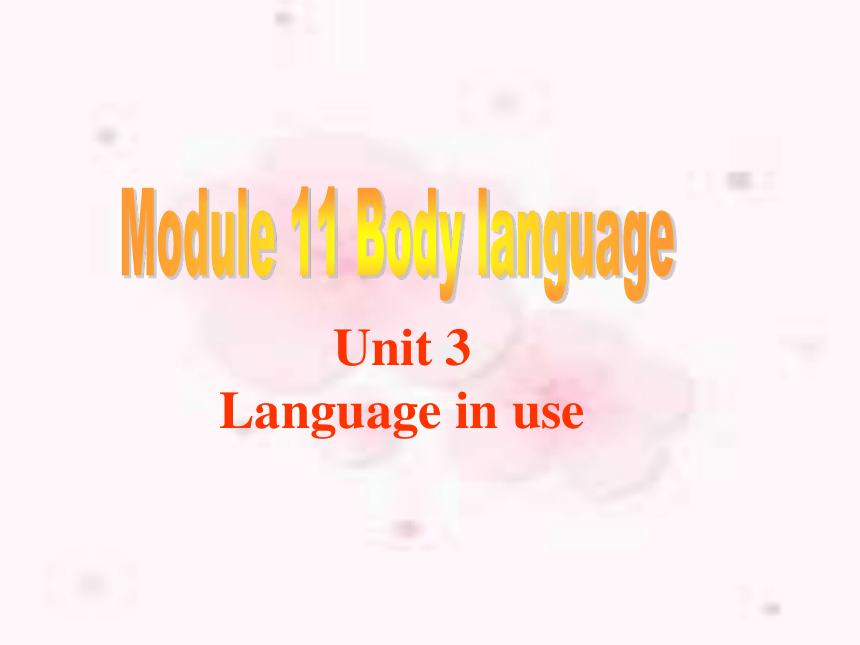 | |
| 格式 | zip | ||
| 文件大小 | 1.6MB | ||
| 资源类型 | 教案 | ||
| 版本资源 | 外研版 | ||
| 科目 | 英语 | ||
| 更新时间 | 2013-05-28 12:44:34 | ||
图片预览


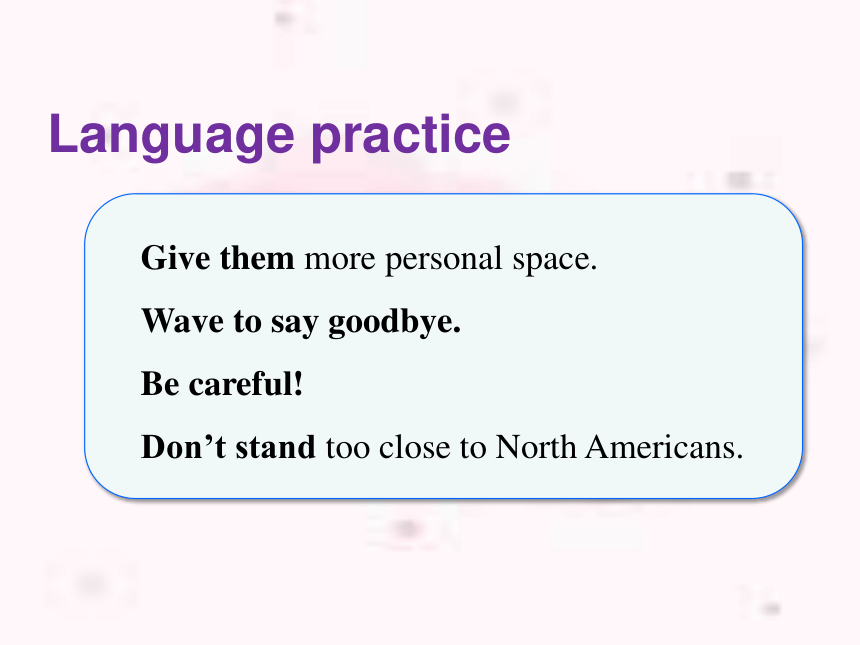
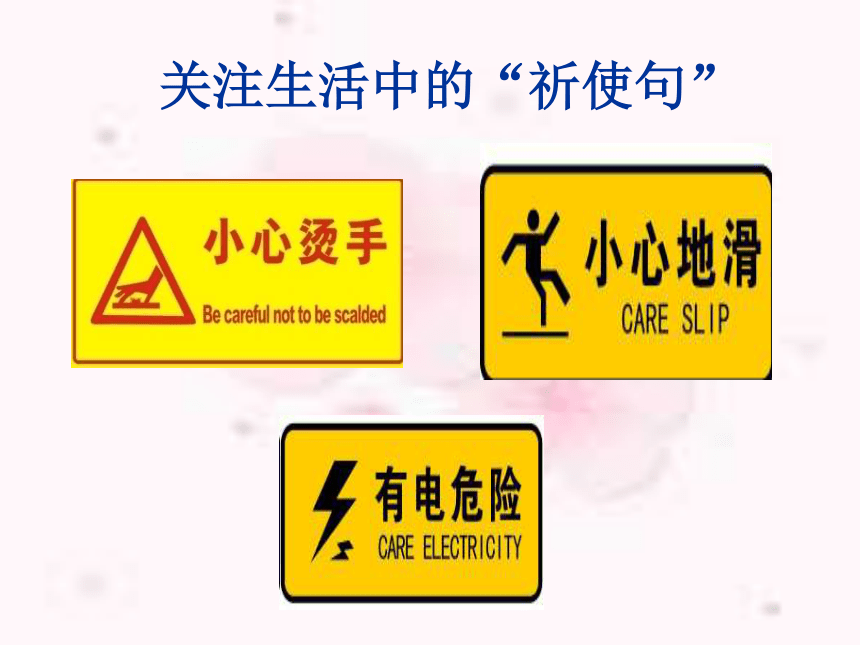
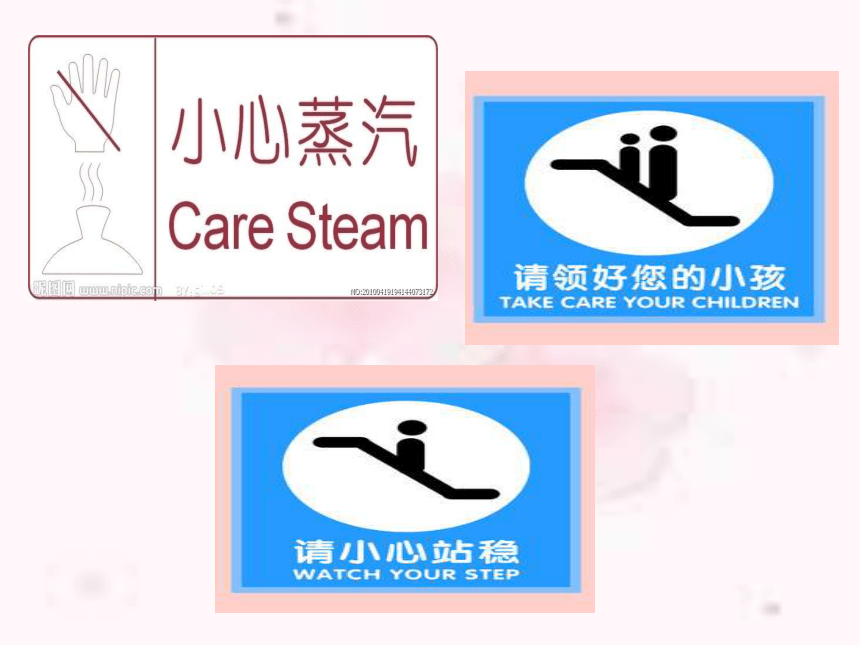
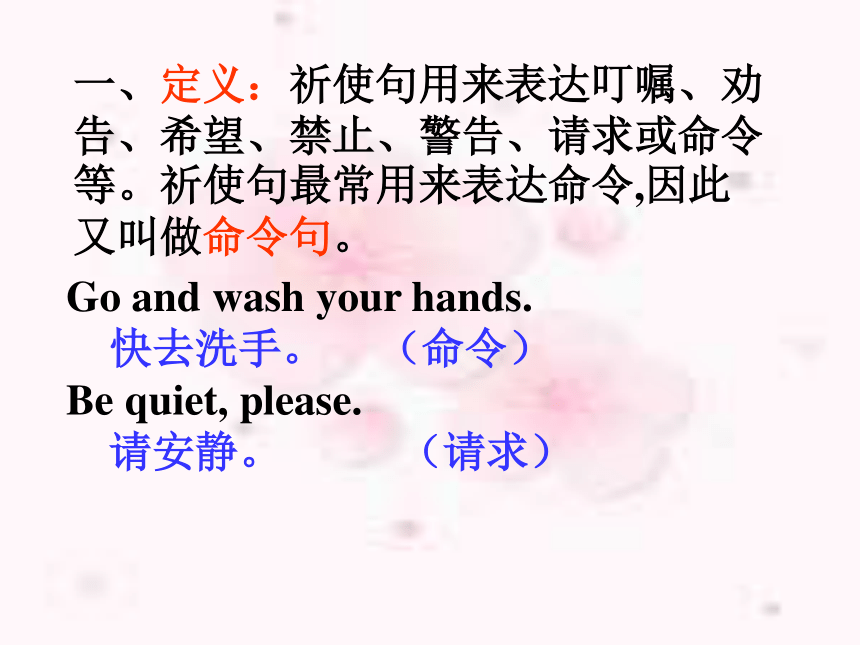
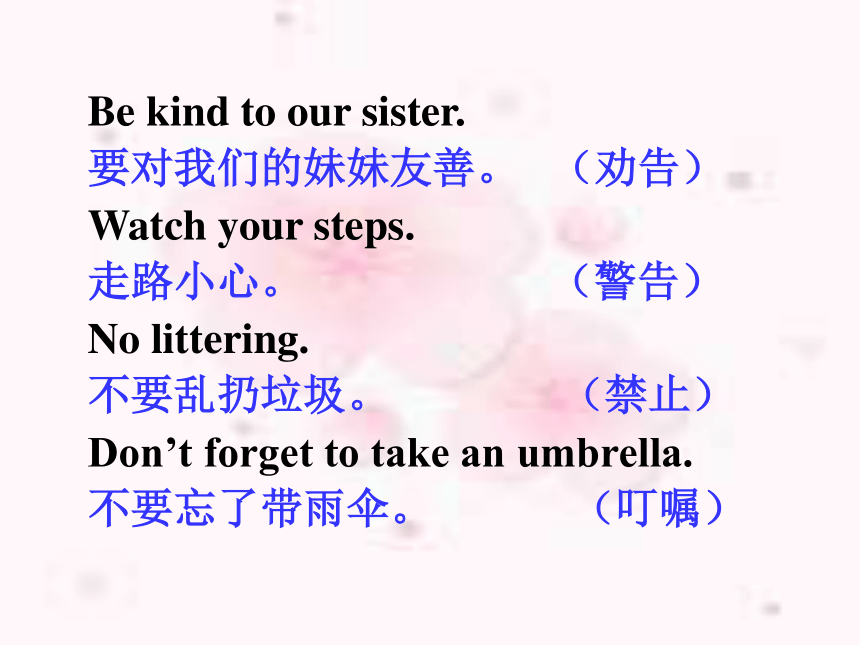
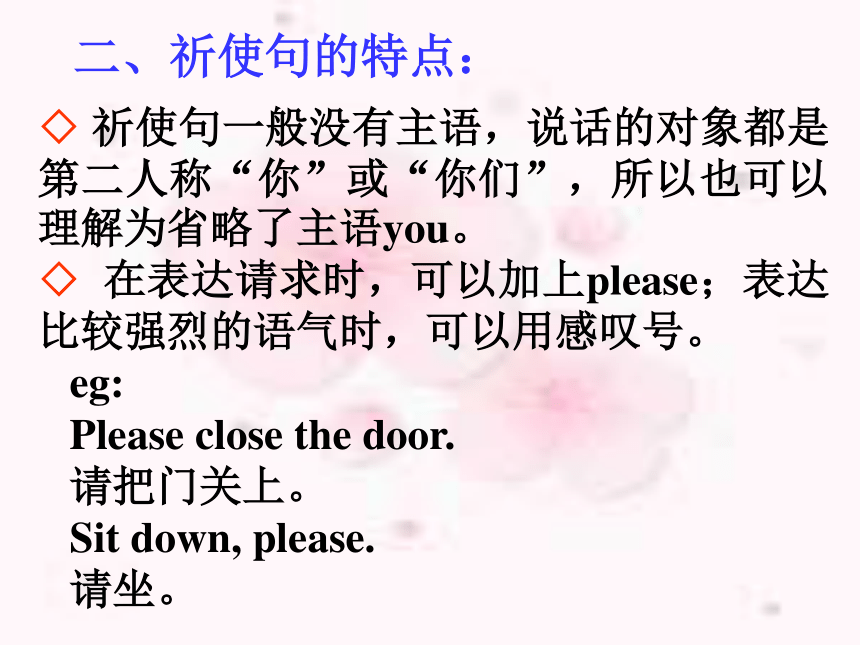
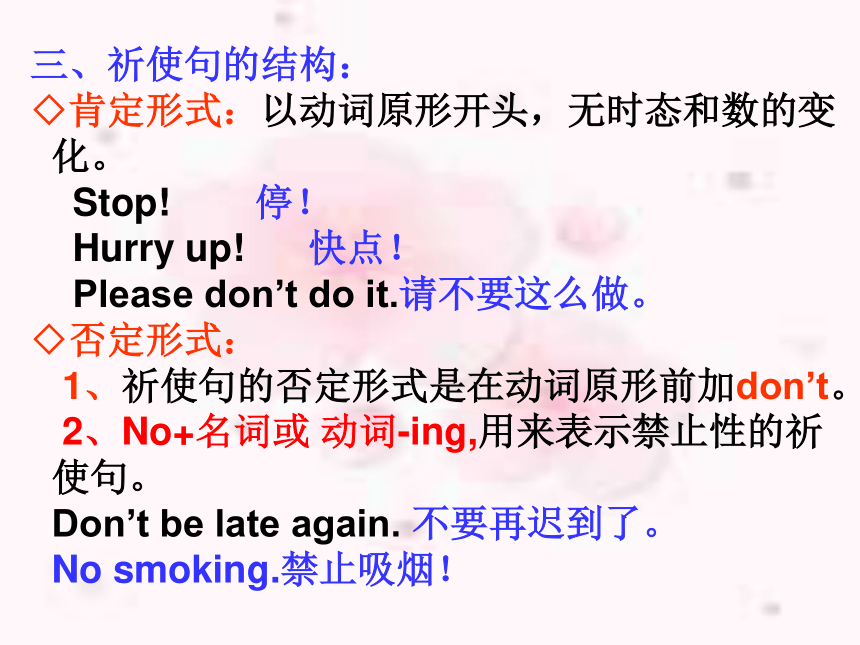
文档简介
课件27张PPT。Module 11 Body languageUnit 3
Language in useTo learn to use Imperatives to
express your attitudeObjectiveLanguage practiceGive them more personal space.
Wave to say goodbye.
Be careful!
Don’t stand too close to North Americans.
关注生活中的“祈使句”一、定义:祈使句用来表达叮嘱、劝告、希望、禁止、警告、请求或命令等。祈使句最常用来表达命令,因此又叫做命令句。Go and wash your hands.
快去洗手。 (命令)
Be quiet, please.
请安静。 (请求) Be kind to our sister.
要对我们的妹妹友善。 (劝告)
Watch your steps.
走路小心。 (警告)
No littering.
不要乱扔垃圾。 (禁止)
Don’t forget to take an umbrella.
不要忘了带雨伞。 (叮嘱)二、祈使句的特点:◇ 祈使句一般没有主语,说话的对象都是第二人称“你”或“你们”,所以也可以理解为省略了主语you。
◇ 在表达请求时,可以加上please;表达比较强烈的语气时,可以用感叹号。
eg:
Please close the door.
请把门关上。
Sit down, please.
请坐。三、祈使句的结构:
◇肯定形式:以动词原形开头,无时态和数的变
化。
Stop! 停!
Hurry up! 快点!
Please don’t do it.请不要这么做。
◇否定形式:
1、祈使句的否定形式是在动词原形前加don’t。
2、No+名词或 动词-ing,用来表示禁止性的祈
使句。
Don’t be late again. 不要再迟到了。
No smoking.禁止吸烟!练习:
将下列汉语翻译成英语。
1. 请照看好您的包。 ___________________.
2. 让我们去学校吧! ___________________!
3. 亲爱的,高兴点儿! ___________________!
4. 不要把书放这儿。 ___________________.
5. 不要让猫进来。 ___________________. Please look after your bag. Let's go to school. Be glad, dear Don't put the book here . Don't let the cat come in 课堂练习答案1. Work in pairs. Talk about do’s and
don’ts in a foreign country.2. Make a list of do’s and don’ts to help
visitors to Britain. Stand in line.
Don’t touch people when you
talk to them.
…Shake hands when you meet a friend.
Stand in line..
Please talk about the weather.
Say “please” and “thank you”.
Look at people when you talk
Don’t touch people.
Don’t ask people personal question.
Don’t ask women’s age.
Don’t talk with food in your mouth.
Don’t be late.
3. Rewrite the sentences.
Eg. It’s important to listen to the teacher.
Listen to the teacher.
You cannot shout in the classroom.
Don’t shout in the classroom.1. It’s important to be careful.
2. It’s important to clean and tidy the lab.
3. You cannot touch anything if the teacher
doesn’t ask you to.
4. You cannot bring food or drink into the lab.
5. You cannot enter the lab alone.Be careful.Clean and tidy the lab.Don’t touch anything if teacher isn’t ask you to.Don’t bring food or drink into the lab.Don’t enter the lab alone.4.Answer the questions. Use the words
and expressions from the box to help you. all right arm in arm close different hold onto
kiss three times point at shake hands with wave1.How do the British say hello to each other when
they first meet?
2. Does body language mean the same thing in
different countries?They shake hands with each other.No , it doesn’t.3. How do the Russians say hello to each other
when they meet?
4. Is it polite to stand close to North Americans?
5. Is it all right to wave goodbye in Greece?
6. How do you usually say goodbye with body
language?They usually kiss three times.No ,it isn’t.No ,it isn’t.I wave my hand.Around the w rldThe Japanese bow
In Japan, people bow to say “thank you”, “sorry” ,“hello”,“goodbye”, “you’re welcome”,“excuse me”, and many other things. Children and young people bow lower when they greet older people. It’s a way of being polite and showing respect.1. ______ this kind of peach, and you will like it.
A. To try B. Trying
C. Try D. Tried
2. __________, or you’ll be late.
A. Hurry up B. Take it down
C. To hurry up D. Hurries up
3. Ssh! ________ talk loudly. The baby is sleeping
right now.
Do B. Does
C. Don’t D. Doesn’t 一、选择题√√√4. “_______ exercise every day, my child. It’s good for
your health,” Father said.
A. Taking B. To take
C. Take D. Takes
5. Don’t _______ too much TV. It’s bad for your eyes.
A. watch B. watched
C. watching D. to watch
6. ________ sleep too late. It’s bad for your health.
A. Do B. Not
C. Don’t D. Please not
√√√二、用括号内所给动词的恰当形式填空。
It’s an important meeting. _________ (not, be) late.
___________ (not, make) any noise! Your mother is sleeping.
__________ (not, speak) with your mouth full of food.
_________ (not, talk) and _______ (read) aloud.Don’t beDon’t makeDon’t speakDon’t talkread5. ___________ (not, leave) your
homework for tomorrow, Larry.
6. _______ (look) out! A car is coming.
7. _______ (give) us ten years and just
see what our country will be like.
8. _________ (not, let) the baby cry.Don’t leaveLook Give Don’t let三、翻译下列各句。 1. 咱们一起玩吧!
2. 请不要迟到。
3. 回答这个问题。
4. 不要这么吵。
5. 上课安静。
6. 不要随处乱扔垃圾。
7. 友好待人。 Let’s play together.Don’t be late, please.Answer the question.Don’t make such a noise.Be quiet on class.Don’t throw litter everywhere.Be friendly to classmates. Write ten short imperatives.
You can use do’s and don’ts.HomeworkThank you!
Language in useTo learn to use Imperatives to
express your attitudeObjectiveLanguage practiceGive them more personal space.
Wave to say goodbye.
Be careful!
Don’t stand too close to North Americans.
关注生活中的“祈使句”一、定义:祈使句用来表达叮嘱、劝告、希望、禁止、警告、请求或命令等。祈使句最常用来表达命令,因此又叫做命令句。Go and wash your hands.
快去洗手。 (命令)
Be quiet, please.
请安静。 (请求) Be kind to our sister.
要对我们的妹妹友善。 (劝告)
Watch your steps.
走路小心。 (警告)
No littering.
不要乱扔垃圾。 (禁止)
Don’t forget to take an umbrella.
不要忘了带雨伞。 (叮嘱)二、祈使句的特点:◇ 祈使句一般没有主语,说话的对象都是第二人称“你”或“你们”,所以也可以理解为省略了主语you。
◇ 在表达请求时,可以加上please;表达比较强烈的语气时,可以用感叹号。
eg:
Please close the door.
请把门关上。
Sit down, please.
请坐。三、祈使句的结构:
◇肯定形式:以动词原形开头,无时态和数的变
化。
Stop! 停!
Hurry up! 快点!
Please don’t do it.请不要这么做。
◇否定形式:
1、祈使句的否定形式是在动词原形前加don’t。
2、No+名词或 动词-ing,用来表示禁止性的祈
使句。
Don’t be late again. 不要再迟到了。
No smoking.禁止吸烟!练习:
将下列汉语翻译成英语。
1. 请照看好您的包。 ___________________.
2. 让我们去学校吧! ___________________!
3. 亲爱的,高兴点儿! ___________________!
4. 不要把书放这儿。 ___________________.
5. 不要让猫进来。 ___________________. Please look after your bag. Let's go to school. Be glad, dear Don't put the book here . Don't let the cat come in 课堂练习答案1. Work in pairs. Talk about do’s and
don’ts in a foreign country.2. Make a list of do’s and don’ts to help
visitors to Britain. Stand in line.
Don’t touch people when you
talk to them.
…Shake hands when you meet a friend.
Stand in line..
Please talk about the weather.
Say “please” and “thank you”.
Look at people when you talk
Don’t touch people.
Don’t ask people personal question.
Don’t ask women’s age.
Don’t talk with food in your mouth.
Don’t be late.
3. Rewrite the sentences.
Eg. It’s important to listen to the teacher.
Listen to the teacher.
You cannot shout in the classroom.
Don’t shout in the classroom.1. It’s important to be careful.
2. It’s important to clean and tidy the lab.
3. You cannot touch anything if the teacher
doesn’t ask you to.
4. You cannot bring food or drink into the lab.
5. You cannot enter the lab alone.Be careful.Clean and tidy the lab.Don’t touch anything if teacher isn’t ask you to.Don’t bring food or drink into the lab.Don’t enter the lab alone.4.Answer the questions. Use the words
and expressions from the box to help you. all right arm in arm close different hold onto
kiss three times point at shake hands with wave1.How do the British say hello to each other when
they first meet?
2. Does body language mean the same thing in
different countries?They shake hands with each other.No , it doesn’t.3. How do the Russians say hello to each other
when they meet?
4. Is it polite to stand close to North Americans?
5. Is it all right to wave goodbye in Greece?
6. How do you usually say goodbye with body
language?They usually kiss three times.No ,it isn’t.No ,it isn’t.I wave my hand.Around the w rldThe Japanese bow
In Japan, people bow to say “thank you”, “sorry” ,“hello”,“goodbye”, “you’re welcome”,“excuse me”, and many other things. Children and young people bow lower when they greet older people. It’s a way of being polite and showing respect.1. ______ this kind of peach, and you will like it.
A. To try B. Trying
C. Try D. Tried
2. __________, or you’ll be late.
A. Hurry up B. Take it down
C. To hurry up D. Hurries up
3. Ssh! ________ talk loudly. The baby is sleeping
right now.
Do B. Does
C. Don’t D. Doesn’t 一、选择题√√√4. “_______ exercise every day, my child. It’s good for
your health,” Father said.
A. Taking B. To take
C. Take D. Takes
5. Don’t _______ too much TV. It’s bad for your eyes.
A. watch B. watched
C. watching D. to watch
6. ________ sleep too late. It’s bad for your health.
A. Do B. Not
C. Don’t D. Please not
√√√二、用括号内所给动词的恰当形式填空。
It’s an important meeting. _________ (not, be) late.
___________ (not, make) any noise! Your mother is sleeping.
__________ (not, speak) with your mouth full of food.
_________ (not, talk) and _______ (read) aloud.Don’t beDon’t makeDon’t speakDon’t talkread5. ___________ (not, leave) your
homework for tomorrow, Larry.
6. _______ (look) out! A car is coming.
7. _______ (give) us ten years and just
see what our country will be like.
8. _________ (not, let) the baby cry.Don’t leaveLook Give Don’t let三、翻译下列各句。 1. 咱们一起玩吧!
2. 请不要迟到。
3. 回答这个问题。
4. 不要这么吵。
5. 上课安静。
6. 不要随处乱扔垃圾。
7. 友好待人。 Let’s play together.Don’t be late, please.Answer the question.Don’t make such a noise.Be quiet on class.Don’t throw litter everywhere.Be friendly to classmates. Write ten short imperatives.
You can use do’s and don’ts.HomeworkThank you!
同课章节目录
- Module 1 Lost and found
- Unit 1 Whose bag is this?
- Unit 2 Are they yours?
- Unit 3 Language in use
- Module 2 What can you do ?
- Unit 1 I can play the piano
- Unit 2 I can run really fast
- Unit 3 Language in use
- Module 3 Making plans
- Unit 1 What are you going to do at the weekends?
- Unit 2 We're going to cheer the players.
- Unit 3 Language in use
- Module 4 Life in the future
- Unit 1 Everyone will study at home
- Unit 2 Every family will have a small plane.
- Unit 3 Language in use
- Module 5 Shopping
- Unit 1 What can I do for you?
- Unit 2 You can buy everything on the Internet
- Unit 3 Language in use
- Module 6 Around town
- Unit 1 Could you tell me how to get to the Nationa
- Unit 2 The London Eye is on your right.
- Unit 3 Language in use
- Revision module A
- Module 7 My past life
- Unit 1 I was born in a small village.
- Unit 2 I was born in Quincy.
- Unit 3 Language in use
- Module 8 Story time
- Unit 1 Once upon a time….
- Unit 2 Goldilocks hurried out of the house.
- Unit 3 Language in use
- Module 9 Life history
- Unit 1 He left school and began work at the age of
- Unit 2 He decided to be an actor.
- Unit 3 Language in use
- Module 10 A holiday journey
- Unit 1 What did you do?
- Unit 2 This morning we took a walk.
- Unit 3 Language in use
- Module 11 Body language
- Unit 1 They touch noses!
- Unit 2 Here are some ways to welcome them.
- Unit 3 Language in use
- Module 12 Western music
- Unit 1 It's so beautiful!
- Unit 2 Vienna is the centre of European classical
- Unit 3 Language in use
- Revision module B
